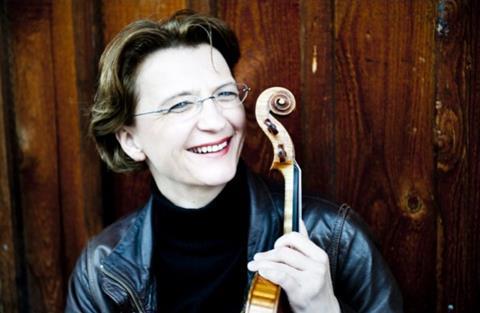Carlos Maria Solare heads to Berlin’s Pierre Boulez Saal for a performance of Beethoven, Clara Schumann and Kurtág on 12 December 2023

Any thoughts that Antje Weithaas’s debut recital in Berlin’s Pierre Boulez Saal might be jeopardised by a last-minute substitution – Enrico Pace replacing an ailing Dénes Várjon at the piano – were laid to rest within a few bars. Beethoven’s A minor Violin Sonata op.23 made for a powerful opening, Pace making his mark with a forceful contribution to this piece ‘for piano and violin’. With both halves repeated, the first movement was given uncommon expressive weight, its final reprise achieving an uplifting sense of homecoming. The second movement’s two contrasting sections were all of a piece, its opening theme – an almost Schumannesque intermezzo – discreetly embellished. It led attacca into the final rondo which featured a shining C major central episode. Subsequently, Clara Schumann’s Three Romances op.22 effectively showcased the juicily songful lower register of Weithaas’s Stefan-Peter Greiner violin.
Read: ‘He helped ignite my ambition’ - Antje Weithaas’s life lessons
Read: Sentimental work: Antje Weithaas on Tchaikovsky’s Violin Concerto
The Strad Recommends: violinist Antje Weithaas: Beethoven
Clara’s first Romance references the main motif of Robert’s A minor Sonata op.105, which followed on the programme, its edgily nervous atmosphere well caught by the duo. Weithaas’s heart-stopping phrasing in the slow movement contrasted most effectively with the finale’s insistent spiccato. Three movements from Kurtág’s Signs, Games and Messages were given a concentrated, Classically shaped reading by Weithaas, showcasing a huge dynamic and chromatic palette that reached from disembodied molto sul tasto to screeching ponticello sounds. In the concluding ‘Kreutzer’ Sonata, Weithaas and Pace took the piece’s subtitle – ‘like a concerto’ – at face value, with no holds barred in a reading that successfully took every risk with outgoing virtuosity at hell-bent tempos in the outer movements and some theatrically characterised variations in the middle one. After the breathless final Presto, the lilting Scherzo from Beethoven’s op.30 no.2 made for a delightful envoi.
CARLOS MARÍA SOLARE










































No comments yet